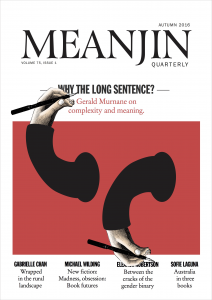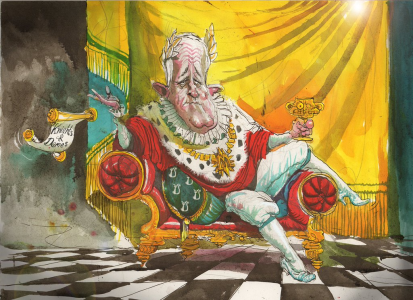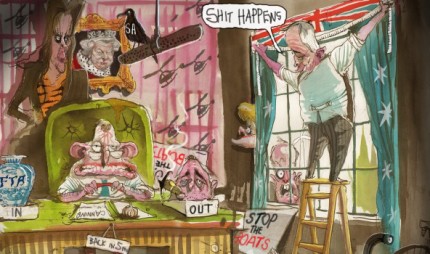Awkward
Monday, 29 February 2016
Why has everyone been so desperate for Tony Abbott to quit the political stage?
It can’t be just his politics. There’s been no great clamour for, say, arch conservative Cory Bernardi to leave, or for a purge of the right in general.
Nor can it be really, as some have claimed, that Abbott hanging around could do the sort of destabilisation that Kevin Rudd did after he was dumped in June 2010. Rudd was popular, Tony Abbott decidedly is not. If anything, Abbott’s culture war forays since he left are likely to make him even less so.
But then Abbott never was popular. His ascension to the leadership in 2009, when Rudd looked unassailable, and the 2010 election a goner, was more a forfeit of the election in return for protecting what was then a more immediate concern of the Liberals, the party’s brand and what it stood for.
The clear contradiction that was known at the time between Abbott’s assertion of a right agenda, and its unelectability, was soon obscured as Abbott’s reaching out to the ‘base’ tapped into Labor’s insecurities about theirs – and we saw Labor effectively make Abbott electable. This confusion should have come to an end in September 2015 when Abbott was dumped in what was presented as an electoral necessity.
But many of the confusions have lingered on. In the opening months of the Abbott government, in the run up to the first Budget, the assumption seemed to be that the chaos of the Labor years had established a new consensus in the electorate for making the tough decisions. This supposed popularity for unpopular action was not backed up by the polls. The government’s honeymoon was weak to non-existent. Yet this was ignored on the hope that with Labor in disarray, the government could now bring about “reform”.
The delusion was to reach its apogee immediately before the Budget with the Commission of Audit proposing the most radical overhaul of the economy in 50 years to a government least able to bring it about. After being urged on by business and the more serious sections of the financial press, the subsequent Budget exposed the fantasy of any such consensus for action and everyone quietly tip-toed away from the car crash and never mentioned “Budget emergency” again.
With Abbott having failed, it was tried again. What we saw, with the gushing profiles of the new Prime Minister, was an almost desperate hope that through sheer force of Turnbull’s personality and polling numbers, he could carry on the process of reform, but sell it better. The clamour for Abbott to go was partly from the fear that he would make what was hoped would be a triumph of Turnbull’s political will much more difficult.
This period of Fabulousness, with political commentators falling over themselves to proclaim a new era, was very silly. It required not only ignoring the political situation the new Prime Minister had returned to, the qualified nature of his return to the leadership, but everything the candidate, and his supporters, had said in the run up to taking over.
They were hoping that Turnbull would deal with the right culture warriors, which Abbott never did, and indeed even at times led. But such faith required ignoring Turnbull’s own culture war moments in the run up to re-taking the leadership – probably the most notorious being his call, along with that other leadership contender, Scott Morrison, for only Christians to be rescued from the Syrian hell hole – something we’re not supposed to talk about now.
Such faith in Turnbull shows a basic misconception about the left/right culture wars. They are not an optional extra. Sure, it’s true that they are usually indulgent and irrelevant to what concerns most people and hardly an electoral asset, indeed probably a negative. But they are vital for political parties that have little social basis to define their existence and instead must create themselves anew in the “battle of ideas”. This role is what Abbott is meant to fulfil.
Howard did it better. His usual tactic was to drop a few culture war asides and wait for the left to kick off and then call them “out of touch”, so playing into Labor’s insecurities about its own eroding union social base. His latest intervention in the uninformative, evidence-free left/right culture war about school bullying is a classic of the genre.
But on the culture wars, Turnbull is stuck. Unable to take the right on, like he might want to, because they remain essential for his party, nor able to convincingly channel them like Howard could.
Following the fumbling over the GST, and the decline in polling since, the period of Fabulousness now also appears to be over. Supporters in the media, who had got carried away with Turnbull’s past culture war gestures, now a few months later express their disappointment at Turnbull not doing what he never said he would.
However, behind the disappointment of clueless cultural warriors, there is a more important element to the paralysis of the Turnbull government where more serious confusions are emerging.
Turnbull was merely expected to sell the existing program, not create a new one. But it is also apparent that there is no program really to sell. Most of it has died in the Senate. The displacement activity over Senate reform underway now, is partly to find a technical solution to what is basically a political problem.
The problem with the Senate reform is not the reforms themselves, other than they don’t go far enough. Manipulation of preferencing of group tickets was fine when it suited the major parties, even when it resulted in stuff ups like Conroy’s cunning plan in 2004 that produced the Senator Fielding sdeshow. Now that it has backfired to the detriment of major parties, suddenly something should be done. Not to the extent, of course, that it gets rid of group tickets that allow the major parties to pass off unappealing party hacks like Joe Bullock.
The problem is more how these reforms are being openly promoted as a means of removing specific Senators and parties that, whatever may be thought of them, were legally elected under the rules. To do this has involved not only delegitimising the Senators and the process that elected, but making assumptions about the voters that elected them (ignorant, fooled) that delegitimises them as well. This is not a great democratic precedent.
It is part of an anti-democratic strain that is creeping into debate, spurred on by the end of the period of Fabulousness. It stems from a fundamental contradiction that has been running through political commentary, especially after the fall of Rudd in 2010. On one hand there has been a rising chorus for government to be tough and enact “reform”, in a way that has been rarely done or even attempted by previous governments. On the other hand, it has become increasingly clear that governments from either side are too weak to do anything much, let alone anything unpopular.
The problem is that this frustration with the impotence of the political process is drawing the wrong conclusion. While governments are being seen as too much pandering to the public and popularity, the real source of the problem is the opposite: the increasing detachment of the major parties from the public and especially the sectional interests they were formed to serve, which makes them not only incapable of carrying out a program, but unsure what that program actually is.
It was highlighted a few weeks ago by the spat between Victorian Liberal powerbroker Michael Kroger and the BCA, in which Kroger accused the BCA of failing to make an effective political campaign for business interests in supporting a hike in the GST.
The obvious retort would be that asserting the political interests of business was supposed to be the Liberals’ job – it was certainly what the party was formed to do. But more importantly it indicates the breakdown between the Liberals and the business community. While the BCA was a Hawke corporatist confection, it did play a role during the Howard years of channelling at least the big end of town’s views into government policy. Yet even then, the existence of such an overt lobbying group for business indicated that the smooth dovetailing of business interests and those of the Liberal party was not what it was. While the BCA was encouraged by Hawke as a separate body from the Liberals to enable him to “bring business and unions together”, that separation has become real.
It is these types of relations with business/unions that gave both major parties their priorities and, more important, critical support, which are breaking down and leaving the parties drifting and directionless. Now this lack of direction is unfortunately being interpreted as a sign of too much “pandering” to the public, when in reality it shows increasing detachment of the major parties from those particular interests in society they were meant to represent.
In trying to replace these lost relationships with tedious culture wars, it may give the parties a sense of political identity cohesion, but have little interest to their traditional supporters, let alone anyone else. In effect, in trying to find a purpose for their existence, the major parties are only making that detachment worse.
So we have a dynamic here. The problem is that it is causing observers to increasingly draw conclusions that have an anti-democratic taste to it. It is a flavour that is seeping into other areas of political debate.
Here again it gives an opportunity for those like Abbott to come across as more in touch and democratic, such as his support for a national vote on same sex marriage – a position that is becoming increasingly unorthodox in commentary but has the unfortunate attribute that it just happens to be, understandably, what the overwhelming majority of the public seems to want. Whether it was an insecure Labor party, and now even more insecure cultural warriors, Abbott, mediocre politician he is, just can’t help being made relevant.
3 commentsThe confusions of anti-politics: US edition
Monday, 1 February 2016
The pitch.
Our country is in serious trouble. We don’t have victories anymore. We used to have victories, but we don’t have them. When was the last time anybody saw us beating, let’s say China in a trade deal?
I beat China all the time. All the time.
Republican and US Presidential front-runner Donald Trump
When is Donald Trump going to stop embarrassing his friends, let alone the whole country?
Rupert Murdoch 18 July 2015
London elites, media, etc sneering at Trump, others. No understanding of mid-America conditions or politics.
Rupert Murdoch four months later
Mr. Trump, in 1999, you said you were, quote, “very pro-choice.” Even supporting partial-birth abortion. You favored an assault weapons ban as well. In 2004, you said in most cases you identified as a Democrat. Even in this campaign, your critics say you often sound more like a Democrat than a Republican, calling several of your opponents on the stage things like clowns and puppets.
When did you actually become a Republican?
Megyn Kelly at the Fox debate
It might seem to be similar. Like UK Labour, the US Republicans are now stuck with a front runner they don’t want and have been trying to get rid of.
But there the similarities end. Read more …
6 commentsFabulous(ish)
Wednesday, 23 December 2015
LEIGH SALES: OK. Let’s whip through a few other things. Your minister, Mal Brough, …
MALCOLM TURNBULL: You’ve lost interest in innovation, have you?
LEIGH SALES: (Laughs) I haven’t lost interest, but there’s a lotta things to get through and there’s limited time.
MALCOLM TURNBULL: Aunty ABC loses interest in innovation.
LEIGH SALES: I wish we had unlimited time.
MALCOLM TURNBULL: Yes, well, there you go.
Press gallery loses interest in the ishoos
I do love Catholics who now think Martin Luther & the Reformation are an example for other religions to follow. Welcome to the 16th Century.
Alex Hawke MP
The attempt by Ian Macfarlane to switch Coalition parties was widely portrayed as marking the end of Turnbull’s honeymoon as it showed that he faced dissension in the Coalition. If that’s the criteria, then it never began. Read more …
9 commentsAn incomplete revolution: Liberal edition
Tuesday, 15 September 2015
A “humble” Malcolm Turnbull promised to be a team player, pledged no radical shifts in policy, and assured there would be no recriminations.
“I listen to everybody,” he said. “I am a great believer in networking. I am a great believer in communication and consultation.”
Malcolm Turnbull assuming the leadership in, er, 2008
For the last five years, Australia has had to endure the tedious process of both major parties regaining control from what Barrie Cassidy called the “party thieves”, Rudd and Turnbull, only to see the major parties make such a hash of it that both “thieves” ended up taking the party back again. Sort of. Read more …
12 commentsThe confusions of anti-politics: UK edition
Tuesday, 8 September 2015
Can I just finish?
The Unstoppable Jeremy Corbyn
If the struggle between Rudd and Gillard over the dead soul of the Labor party, and the hollow leadership election that followed, occasionally descended into farce, it is nothing compared to what is now going on in UK Labour. Read more …
10 commentsRace
Monday, 24 August 2015
To paraphrase a great rugby phrase ‘go you Goodes thing’ and to quote Warren Mundine ‘stop the boos’
Tweet from the very clever Scott Morrison
I just find it incomprehensible that the state of Australia is so racist that we have widespread tolerance and support for the most vicious kind of racism that I haven’t seen since the dark days of the end of apartheid
Some perspective from Marcia Langton
Probably for some the jeers are mindless, just revelling in something taboo. But increasingly, that dull drone is sounding like an assertion of power: crowds of non-Indigenous people declaring, “We will keep doing this and you can’t stop us”.
One sports writer expressing the darkest fears
Like most developed countries, Australia has a race problem. It might not take the form it does in the enlightened country this writer comes from, of cops regularly shooting black people in the streets (curiously omitted in the piece), but it exists and mostly is focussed on indigenous people.
Here are a few examples highlighted by this blog. Read more …
10 commentsLeadership watch: Morrison on 730
Friday, 14 August 2015
They’re my personal views, Leigh, and I’m not going to impose those on the rest of the country.
Scott Morrison formulates the platform for the Australian right
Scott Morrison’s had a very good week and it’s written all over his face. Read more …
24 commentsEquality
Wednesday, 12 August 2015
I thought we were supposed to be talking about climate change today.
Julie Bishop not getting the memo
Well thank goodness that’s been cleared up.
As things stand now Australian voters have the clear choice on same sex marriage between one party that will have a binding vote that may be a conscience vote after the next election, and another party that has a conscience vote that will be binding the election after that. Of course the side that has a binding vote is being attacked for doing so from the other side by those who are, at the same time, arguing for a binding vote on their own side. Meanwhile the side that has the binding vote keeps reminding everyone that the party doesn’t really have binding votes on anything anyway and some are likely to cross the floor if it came to a vote, which they hope it won’t.
Finally, the side that’s not that keen on same sex marriage will likely be proposing a plebiscite, which given the polls, they will probably lose, while the other side that does want same sex marriage (sort of) is less keen on a plebiscite they will probably win.
Is anyone following this? Good. Read more …
25 commentsUnity is death
Monday, 27 July 2015
In 2002, the up and coming shadow Immigration Minister launched a tough new line for Labor’s policy on asylum seekers. It wasn’t popular at Conference, but the hardheads felt it was necessary. Labor had lost an election on immigration, the current leader was unpopular and seen as weak, and Labor felt the Coalition was making hay with the perception Labor was too soft on asylum seekers. Labor went on to lose the next election with what was then the lowest primary vote in the post-war period.
In 2010, that former shadow Minister, now leader, Julia Gillard (for it was she), went into an election with a new tough line on asylum seekers. It wasn’t popular in the party, but the hardheads felt it was necessary. They and Gillard were worried that the Coalition was making hay with the perception Labor was too soft on asylum seekers. She went on to achieve what was then Labor’s second lowest primary vote in the post-war period. Read more …
4 commentsThe hole in the middle of national security
Monday, 20 July 2015
ZAKY MALLAH: Yeah. Yeah, sure. The Liberals now have just justified to many Australian Muslims in the community tonight to leave and go to Syria and join ISIL because of Ministers like him.
TONY JONES: Okay. I think that’s a comment we are just going to rule totally out of order.
The anniversary of the shooting down of MH17 was an unfortunate reminder of how hollow the political and media outrage was that followed it. Read more …
4 comments

 David Rowe, AFR
David Rowe, AFR



